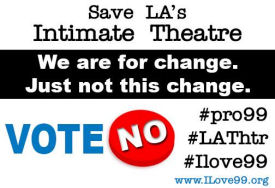
 Over the last few weeks, my attention has been caught up in a brewing battle here in Los Angeles: the battle between Equity Actors and their union, AEA. Now I’m not an actor, but I am an audience; as such, I have a stake in this battle (although we audience members are oft forgotten and taken for granted… this is grating on me and I’m starting to think about what I’m going to do on that. More in a subsequent post.) The battle is a nasty one — and one that outsiders won’t understand.
Over the last few weeks, my attention has been caught up in a brewing battle here in Los Angeles: the battle between Equity Actors and their union, AEA. Now I’m not an actor, but I am an audience; as such, I have a stake in this battle (although we audience members are oft forgotten and taken for granted… this is grating on me and I’m starting to think about what I’m going to do on that. More in a subsequent post.) The battle is a nasty one — and one that outsiders won’t understand.
The world of creatives is not the real world. Nowhere is this made clearer than in this battle, where you have the union fighting management for higher wages, and the “employees” fighting the union for the right to earn no salary, just a small stipend. When I present the subject that way, you’re probably thinking the union is on the right side. But you would be wrong, primarily because the creative world is not the normal world.
Consider the life of an actor in Los Angeles. If you are lucky, you earn your living in the TV or movie industry. If you are really lucky, you are acting in front of the camera, likely doing completely unchallenging work such as commercials or sitcoms. If you are ordinarily lucky, you are working behind the camera in an unsung role. If you are typically, you are paying the bills with a non-creative job — working in a traditional job in a traditional workplace. The point is that you are not expecting to earn a living wage on the live theatre stage — there just isn’t the audience in LA to support it.
But there are loads of theatres in LA, you say. Yup, there are. The big ones tend to bring in outside talent, not local actors. The small ones often exist not to make money, but to provide a place for actors to hone and exercise the acting muscle — just like you exercise at the gym. With more use it gets better and stronger. An interesting aspect to that analogy: you pay the gym to work out; the gym doesn’t pay you.
Actors in 99 seat theatre haven’t been compensated through salary. They have been compensated through the work, and through the connections they have made in the industry. Often those are more valuable than the $300 that might be earned.
Actors Equity (AEA) wants to change that. They want to mandate that most non-profit theatres pay minimum wage to actors, treat them as employees (with all the employee overhead), and have formal contracts with AEA that include compensation to the union for their services. This would increase that cost of theatres already operating on a slim margin, and put many out of business. Yes, a theatre may raise a lot of money. Much of that goes to rent, insurance, equipment rental, operating costs, and outreach to the community. It doesn’t go to salaries — no one is becoming rich on 99 seat theatre.
The actors want to change the current 99 seat plan, but not this way. They want to work with producers, other creatives, and equity to create a realistic plan that will work, and is likely tiered. A plan that will permit 99-seaters to grow and become equity houses; one that does not impose by fiat.
What’s troublesome is the union tactics. There is intense misreprentation going on. The union says a yes vote is one for a proposal that can be changed, but they have also said the yes is just on this proposal as written. Further, the union has indicated privately that if this passes, they intend to bring the minimum wage fight to New York. The actors are for change, but not this change, and are urging other actors to vote “no”.
Why do I care? I’m an audience member. I can’t vote. I don’t run a theater.
I do, however, buy tickets. I do, however, enjoy the wide variety of shows in Los Angeles. I do, however, enjoy the theatre on the edge that is created here. I do, however, enjoy being able to see both Equity and future Equity actors on stage. I do, however, enjoy being able to critique and provide constructive criticism to them to make them better. I might lose all of that if this passes.
If you are an audience member like me, let your actors know you support them. If they are AEA, educate them and encourage them to vote this proposal down. Write Equity and let them know you don’t approve of their tactics, and that if they continue their tactics, you will be perfectly willing to support, attend, and encourage non-Equity productions in Southern California. Let them know the only party that this action will hurt is AEA — they will lose public support, they will lose members, and people will learn that non-Equity actors can be just as talented as Equity actors. Let them know that Southern California audiences support those who make and act in our 99-seat houses.


 We have so much news chum stew for you this week we couldn’t fit it all in a single bowl. So here’s a second tasty helping:
We have so much news chum stew for you this week we couldn’t fit it all in a single bowl. So here’s a second tasty helping: